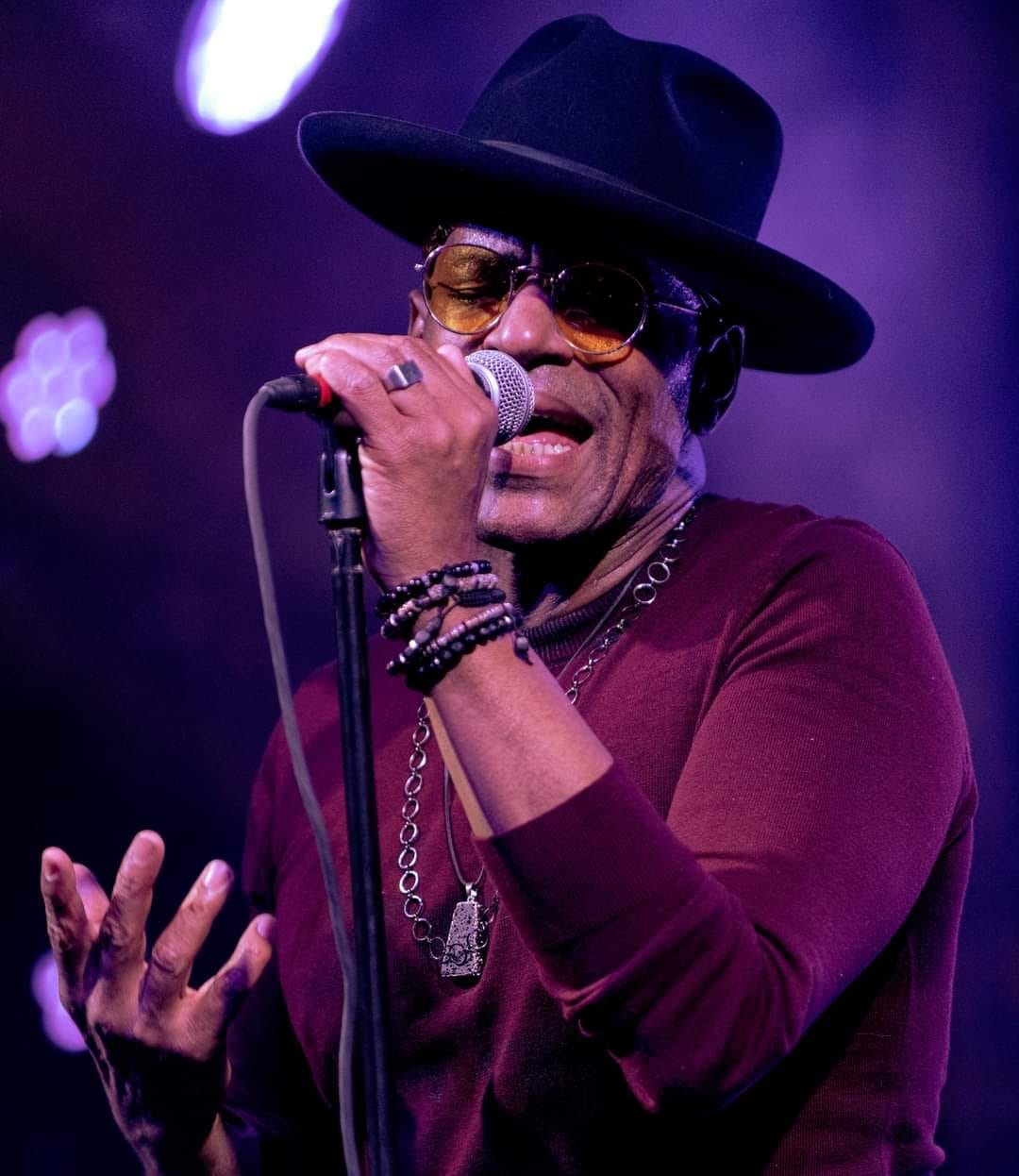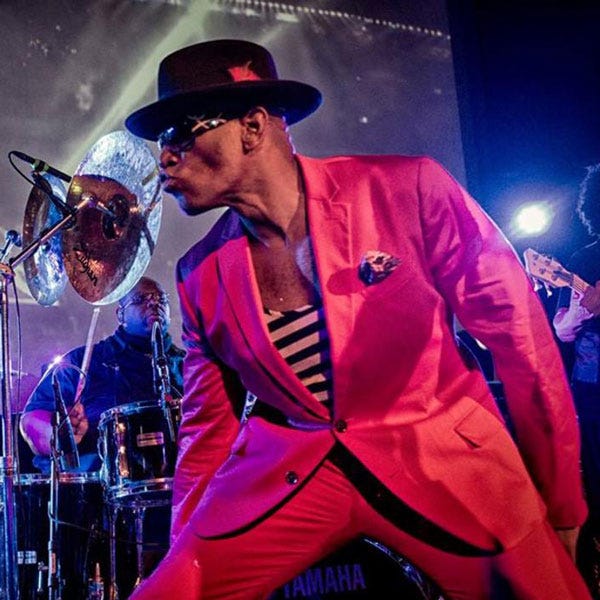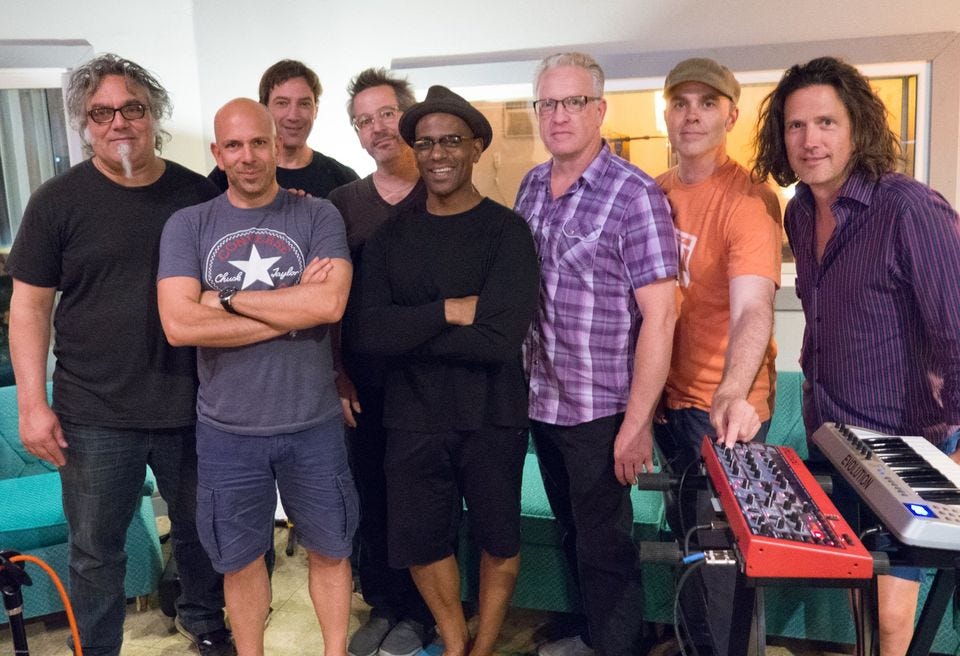Prince-connected Twin Cities vocalist from Waterloo coming home for May 20 show
Mentored by Prince, Minneapolis music scene veteran Julius Collins will perform at Waterloo's Electric Park Ballroom
MINNEAPOLIS – Sometimes life’s journey isn’t clear-cut, black and white. It has different hues.
That’s certainly true for Waterloo-raised Julius Collins. His life, and music career, has been graced with shades of purple.
That’s purple as in “The Purple One,” Prince Rogers Nelson, more popularly known as Prince.
The late legendary pop singer/songwriter was as supportive as a pastor and as tough as a football coach to Collins, over an association spanning 25 years.
Collins honed his skills and performances has become an established, well-known and popular performer in the Twin Cities – his mentor Prince’s home turf.
And now, Collins’s career and life come full circle. To borrow a line from another Minnesota songwriter, Bob Dylan, Collins is “bringin’ it all back home” for a first-ever performance in his hometown of Waterloo May 20.
Not just anywhere in his hometown, but at Waterloo’s historic Electric Park Ballroom, on the National Cattle Congress grounds. And not just on any occasion, but at his high school class reunion.
It's a big enough deal, and his classmates in the East High Class of 1983 think so much of Collins, that they are opening the event up to the general public.
But no pressure. Not too much.
Though his renown with Prince-mentored bands has spread to Europe, he admits to a little nervousness about playing a gig in his hometown. But he’ll put his all into it - just as he learned as a young boy in church choir here.
Collins was born in Chicago and moved to Waterloo just before 2, when he was placed in a foster home with Fannie Mae “Dolly” Page.
“I am inclined to think that really did go a long way to shape who I am, for better or worse,” he said self effacingly. “She was quite the East Side matriarch. She was really a remarkable woman. Dolly, she was an iron hand. She meant business and didn’t suffer fools.”
It also meant going to church three times a week at Mount Carmel Missionary Baptist Church. It opened his world to music.
“That church is where I really learned about how to sing with meaning,” Collins said. “That church has so many great singers. Legitimately fantastic singers. Interesting instruments. I just remember as a kid just being just feeling so lucky I got to hear them. It was really educational for me.”
He also joined choir at church and school. “Choir at church was a very different animal than choir at school,” he said. He gained perspective between the structured harmonies at school choir and the music he heard at church, which was like “a bunch of soloists.” It’s a seeming duality which he continues to synthesize and balance in his songwriting and performing.
But music, wherever and whenever he performed, lifted him up.
“As a kid, I was invisible. I felt lonely. I was a sad little dude,” he said. ”At church, I felt like I was in a situation were I was being held; where people saw me and cared about me. They called me ‘Little Brother Juju.’ That was my nickname growing up. And it meant something to me.”
He attended Grant Bridgeway elementary school and had his first band in fifth grade – JC and the Bridgeway Band.
“That was the beginning of my band life,” he said. “I learned how much I didn’t want to be a solo aritist; I wanted to be in a group. I felt safe in groups. I felt like I could be the key mechanism in a group. I just loved the feeling of being a part of something. We played some Stevie Wonder, because that’s my guy; we played some Rufus. For some kids, we weren’t too bad!”
He joined a Christian rock band at age 16, “Arrival” and began touring a bit. “That’s when I realized that was something I really would love to do,” he said. He was also involved in high school choir and show choir. “That was my introduction, peripherally, to theatre,” and performance movement with music.
After he graduated from East High, he was reunited on a more regular basis with his birth mother. Home life was good but he was looking for purpose, and enrolled at Hawkeye Institute of Technology, now Hawkeye Community College. “I never was much of an academic,” he said, but a teacher there made him aware of a school in Atlanta, Music Business Institute.
“I ended up going, and it was really good for me,” he said. “I got out of Waterloo. I have some bittersweet emotions about Waterloo. I took what I loved about Waterloo with me and I kind of left Waterloo behind, and I don’t mean that derogatorily. There was some unbelievable sadness there for me. If it wasn’t for music, and being a wrestler (at East High, under Coach Steve Knipp) …Music and sports really saved my life. It gave my life purpose.
“When I got down to Atlanta, I forged some really amazing relationships,” he said. “I learned about things I didn’t really think about much as a performer, and how important they are to making a (performance) experience matter for people. I learned about songwriting, I learned about music production and video production. Those were really good lessons for me and I did really well in school.”
He began working at Rupert’s Nightclub in Atlanta. “Rupert’s was at the time sort of THE nightclub experience,” he said; it was a larger version of the original one in Minneapolis.
He'd been at different clubs but Rupert’s in Atlanta “was like a concert theater experience,” he said. “That was when I stared to push and stretch as an artist and a performer.”
He worked there in the late ‘80s. In 1991, fellow musicians encouraged him to go to Minneapolis. There, he had an epiphany.
“I went to this, I would classify it as a dive bar,” he said with a smirk. “Outside there were like, 15 Harley-Davidsons. I was thinking to myself, ‘I’m gonna have to fight my way out of this bar. I just know it.’ My friends said, ‘Man, you just need to relax.’ Once we got in there, sure enough, there were like the most murderous-looking dudes you’ve ever seen on your life lining the bar, biker jackets. I said, ‘holy Lord!’
“But then I looked around the room,” Collins said. “There were Black people, there were white people, there were straight people, there were gay people, brothers in fedoras, people in Birkenstocks and tie dye. All these different kinds of people. It was like my idea of heaven. Everybody was so beautiful and the energy was so easy because they were all there to see that band.”
And his companions got him a “foot in the door” with the band. It was Dr. Mambo’s Combo – a band he now regularly fronts for at the bar – Bunker’s Music Bar and Grill.

“Friends introduced me to the leader of the band and said, ‘You’ve gotta hear this guy sing.’ “ Collins recalled. “He said. ‘If these guys say you can sing, I’m sure you really can sing. But unfortunately, Prince and Sheila E are sitting in here tonight.’
“Five minutes later, sure enough, there’s Prince and Sheila E going up to the stage,” Collins said, and he understood why they were sitting in. “This band was the savviest group of musicians I’d ever seen in my life. Always having a conversation. It was fascinating.
“I’d go every week to listen to this band.” Eventually, Collins broke in with the group.
“I still play every Sunday night with this band,” he said. “This was Prince’s favorite band; toured with Prince and Mavis Staples.”
Prince was a regular visitor. Sometimes he played and sometimes he watched, usually making an unobtrusive entrance following a quick sweep by his security detail. When he sat in, he would just strum or “noodle” with the band on a guitar borrowed from the lead guitarist.
“If you didn’t know he was one of the biggest stars in the history of music, you’d just think he was a fantastically dressed guy up there just hanging out,” Collins said. “That was him. He was about the music, which I really love.”
The drummer at that time of Dr Mambo’s Combo was Michael Bland – Prince’s drummer. Collins got his first chance to sing with the band that second night at Bunker’s.
“Michael was playing drums that night, and I sat in with the band. And after I finished singing, Michael,” a big man, “stood up and said, ; ‘You wanna start a rock band?’ And I said, ‘Yes, I think I do.’ ”
And Collins had found where he belonged.
“I never played in a band where all the musicians were obviously virtuosos. They were so remarkably gifted in the way they played music and the way they understood music,” he said. It was a confluence of his structured school music training and the free-spirited church music back home in Waterloo.
“It was like my two worlds colliding musically,” he said “It was like ‘Dude, I am NEVER, EVER leaving this city,’ “ He called his wife back in Atlanta, seven months pregnant with their daughter “and I said ‘Babe, we’re moving to Minneapolis.’ “

He and Bland stared a band called Black Julius. “And Prince managed us,” Collins said. “All my friends played with Prince,” including Bland and rhythm section members Tommy Barbarella and Sonny Thompson, among others.
“Prince is just……he was just an interesting dude. I don’t know how else to say it,” Collins said, noting he was “a genius” composer.
“Watching him run bands and perform was incredible. Being managed by him is a very different experience.” Collins said. After a show, the band would go to Prince’s home at Paisley Park for what Collins termed “a film review,” like a football coach going over game films, frequently into the wee hours.
“He was like ‘Don’t ever do that again,’ or ‘That was all right,’” Collins said. “Those experiences were educational. But they were hard. I got to watch that dude run a band. It really, really did help me understand what I need to do.”
Collins then became part of a band called Greazy Meal, which, due to its connection with Prince, had appeal not only in the upper Midwest, but was “very popular in Europe,” where the band toured.
It was “the most important project I’ve ever done,” Collins said. “I didn’t realize until I went over to Europe how much people knew about my career. I remember being in Italy at a bar and a guy proceeded to tell me every project I’d ever done.” In contrast, he said, “Most people three states over have no idea who I am.”
Fans also came from Europe to the Twin Cities to see his and other bands. Minneapolis is “like a mecca” in that regard musically, he said.
With Greazy Meal, “that was a time when I really pushed my own personal performance envelope,” he said, and he’s been a name on the Twin Cities music scene ever since.
He’s currently involved in a “gospel, funk and roll” band project with Bland, Barbarella and Thompson called “Sons of Almighty.” It hearkens back to his church music experience in Waterloo. He said he and Bland would spend time exchanging the hymns they knew.
“My gospel experience, I just feel so grateful for it. I know where my origin is, in terms of where my singing comes from,” Collins said. “It’s important that it (music) means something when it happens. It’s because of people at that church. They would lay it on the line every Sunday,” and he’s seen that from fellow performers, male and female, with a similar gospel background.
”I never ever, no matter who’s in the room, no matter how big or small the situation is, I don’t ever want people to leave the room with the impression I didn’t care,” Collins said. “Those things about Waterloo are formative and mean a lot to me.”
While his early life in Waterloo was very “Afro-centric” he found white visitors to church were very gracious, and he had more contact with white people through school. ”Really beautiful people,” he said. “Some my bands, often times, are very integrated. Perspective means something,”
Regardless of band members’ backgrounds, they’re unified by one thing: the music.
“In the end, with music, it’s just like Prince said: Either you can play, or you can’t,” Collins said. “If you can do it, that will be the determining factor on whether or not we roll together.”
He’ll lay it on the line May 20 in Waterloo.
“I’m a little nervous about this,” he admitted. “But these are the first people who held me closely, and I think it’s going to be beautiful. We’re going to do our best to put on a good show.”
His East High classmate, Joel D. Elliott II or “Joel D” a radio producer, journalist and club deejay from Los Angeles, will be a deejay for the evening. John Berinobis will open with a guitar set.
Tickets for the May 20 show may be purchased at the National Cattle Congress office, (319) 234-7515. or at the link below.







